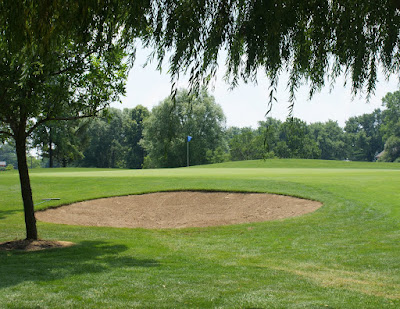Here are some quick facts on ballmarks:
- Unfixed ball marks result in an uneven and scarred putting surface
- It is the responsibility of every golfer to fix at least their own ball mark
- It can take 2 or 3 weeks for an unfixed ball mark to heal
- Fixing ball marks vastly improves the putting surface for everyone
When I first started golfing in grade school, I assumed the best way to fix a ball mark was to use a tool to pry up the middle of the indentation. This seems logical but it can result in torn roots and more recovery time. The best way is the "twist" method endorsed by the Golf Course Superintendents Association (GCSAA).
Here is the secret: Your goal is to stretch the undamaged surface back into the depression, not to lift the depression by prying. The putting surface is actually a fairly elastic thing. Ball impact pushes the surface out to form the ridges around the depression, so you can fix it by stretching the surface back in. In the process, the indentation or depression should flatten out.
Here is the secret: Your goal is to stretch the undamaged surface back into the depression, not to lift the depression by prying. The putting surface is actually a fairly elastic thing. Ball impact pushes the surface out to form the ridges around the depression, so you can fix it by stretching the surface back in. In the process, the indentation or depression should flatten out.
Here is a graphic from the GCSAA. Please click the image for a larger image:
I think many people are reluctant to try this method because it is difficult to visualize. As a result, many golfers may not attempt to fix their ball marks because they are afraid of doing it the "wrong" way. I am going to go out on a limb and say "If you have a method that works for you and results in a puttable surface, go for it!" If you don't, try this method. You may be suprised by how easy it is.























